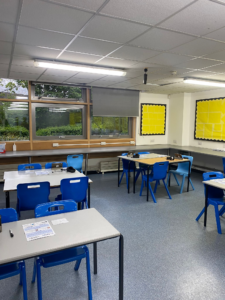
As adolescents, we have the challenge of navigating our complex social relationships alongside experiencing stronger emotions and feelings. Sometimes, our emotions and relationships can negatively impact on one another. For example, we might remember a time when we had a disagreement with a friend, how this made us feel upset, and how this affected our conversation with another person, such as a parent.
We know that social relationships and emotion-processing abilities are closely related to mental health outcomes during adolescence. In recent years, emotion processing and social relationships have been investigated in isolation; our new intervention aims to explore the interplay of emotion processing and social relationships in the development of mental health problems. Specifically, we aim to find out if training emotion processing and social skills in adolescents aged 12-14 years can promote positive mental health and well-being.
The ReSET intervention

We have developed a new psychosocial intervention called the ReSET intervention, which combines elements of Interpersonal Therapy (IPT) with app-based cognitive-emotional training. Through group sessions, young people learn important social skills that help them maintain and improve their relationships with others. Students are asked to engage in role-plays related to issues that they face in their daily lives, such as a conflict within their friendship group. Through this, young people practice strategies – which we call “We Strategies” – to consider different ways of resolving these interpersonal problems.
In addition to the role-play exercises, young people complete two cognitive-emotional training activities related to emotion perception and emotion regulation that we call “Me Strategies”. Emotion perception training aims to shift the individual’s bias from viewing other people’s emotions as hostile towards recognising positive emotions. Emotion regulation training encourages young people to practice emotion regulation strategies that promote positive mental health outcomes, such as thinking about how we might feel about a situation after a length of time.
Both emotion perception and emotion regulation have been implicated in poor mental health outcomes during adolescence, so training these skills is one potentially fruitful way to improve mental health outcomes. Throughout the groups young people are supported to make links between the “Me” and “We” Strategies and apply these skills to their everyday lives.
The ReSET intervention consists of eight sessions delivered at school in groups of up to 10 young people. These sessions are delivered over two school periods (approximately 1.5 hours) by an experienced facilitator.
Before the group sessions begin, the facilitator meets with each young person to discuss personal aims for taking part in the group. Halfway through the intervention, the young people meet with the facilitator to review their progress and discuss any challenges they are experiencing.
The research design and outcomes
Before the intervention, participants are randomized to the intervention or control groups in an assessor-blind cluster randomised design. One year group in each participating school is randomly selected to receive the intervention while the other year group is assigned to a control condition, completing their usual school schedule.
To assess whether the trial is successful, we will measure young people’s mental health and wellbeing to see if there are differences between the intervention and control groups. Our outcomes of interest are general mental health, measured using the Strengths and Difficulties Questionnaire, and wellbeing, measured using the Warwick and Edinburgh Mental Wellbeing Scale (WEMWBS).
These measurements take place before the intervention starts, immediately after the intervention, and at a 1-year follow-up. We will also collect data measuring young people’s ability to process emotions and their social relationships, which can help us to identify the individuals who benefit most from the intervention.
Conclusion
Adolescence is a critical period of social and emotional development. We have developed this new intervention to give young people the tools to communicate more effectively and process their emotions in a healthy way. Our aspiration for the trial is to provide young people with tools to navigate social relationships in adolescence in ways that promote well-being and good mental health.
Comments